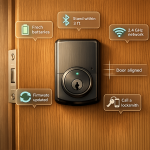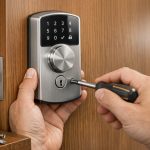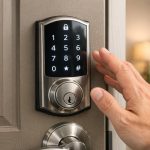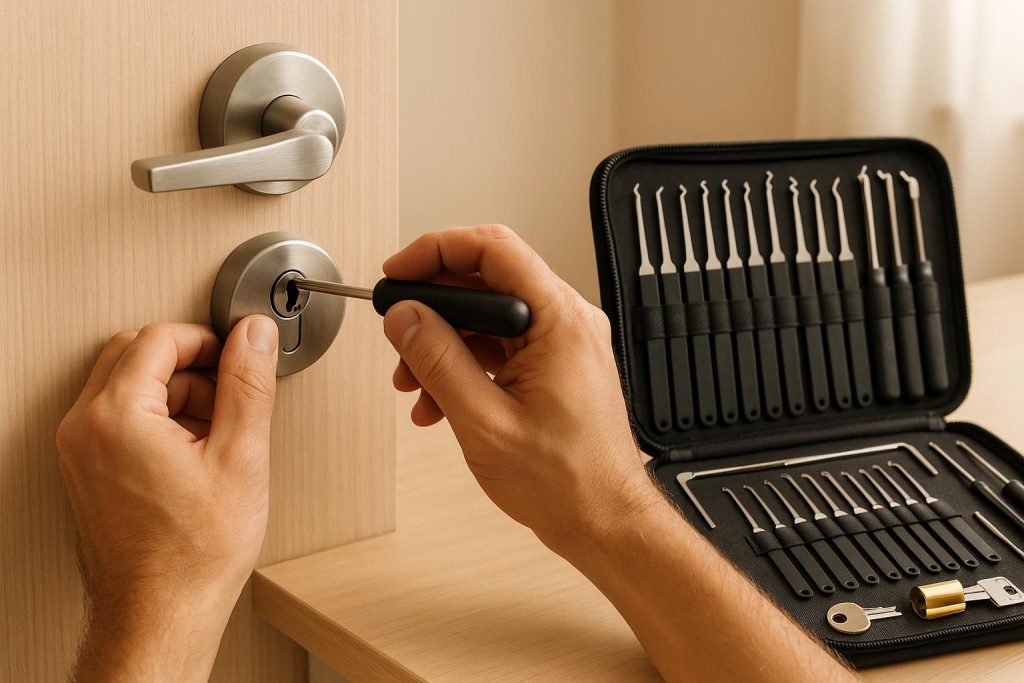When your lock breaks, you have two options: fix it yourself or call a locksmith. Here’s what you need to know:
- DIY Lock Repair: Cheaper upfront, but requires tools, time, and basic skills. Best for simple fixes like tightening screws or cleaning a sticky lock. Risks include incomplete repairs or even damaging the lock further.
- Hiring a Locksmith: Costs more but guarantees professional results. Locksmiths handle complex locks, provide 24/7 emergency services, and often include warranties. Ideal for advanced systems or urgent security needs.
Quick Comparison
| Factor | DIY Repair | Professional Locksmith |
|---|---|---|
| Cost | Lower upfront, risk of errors | Higher upfront, includes labor |
| Time | Can take longer | Quick and efficient |
| Tools Needed | Basic tools | Specialized equipment |
| Skill Level | Requires basic knowledge | Extensive training and expertise |
| Security Assurance | Risk of incomplete fixes | Reliable, secure solutions |
| Emergency Help | Limited by your availability | 24/7 service |
For simple tasks, DIY might work. But for complex or urgent issues, hiring a locksmith ensures safety and saves time.
Locksmith Vs DIY: When to Call a Professional
DIY Lock Repair: Pros and Cons
Fixing a lock yourself can save money and give you control over the process, but it’s not always the best solution when the problem is more complicated.
Benefits of DIY Lock Repair
One of the biggest advantages of DIY lock repair is cost savings. By skipping labor fees, you can save a good amount, especially if you’re working on multiple locks. Plus, you can tackle the repairs whenever it’s convenient for you, without waiting for a professional to fit you into their schedule.
There’s also a sense of accomplishment that comes with doing the work yourself. It’s a chance to learn new skills, gain confidence, and even decide exactly which tools and replacement parts you want to use. DIY is perfect for smaller tasks like cleaning or lubricating a sticky lock, tightening screws, or adjusting strike plates. Another bonus? You keep your security details private, which some people find reassuring.
But, as helpful as DIY can be, it’s not always the right fit for every situation.
Risks and Problems with DIY
While DIY works great for basic maintenance, things can get tricky when you’re dealing with more complex repairs. Without the right tools or expertise, you might end up with a fix that doesn’t fully solve the problem – or worse, compromises the lock’s security.
DIY Pros and Cons Summary
| Factor | Benefits | Drawbacks |
|---|---|---|
| Cost | Avoid labor fees, saving money upfront | Risk of incomplete repairs if you lack the necessary skills |
| Timing | Work on your own schedule and address issues quickly | Complex repairs may require more time and expertise than you can provide |
| Skill Level | Learn new skills and gain confidence through hands-on experience | Requires technical knowledge and access to the right tools |
| Security | Keeps sensitive security details private | DIY repairs might not fully secure the lock if done incorrectly |
| Customization | Choose your tools and preferred replacement parts | Professional-grade equipment may not be readily available to non-experts |
Your choice to go the DIY route depends on how comfortable you are with home repairs and how complicated the lock issue is. For simple maintenance tasks, it’s a budget-friendly and rewarding option. However, when dealing with intricate mechanisms or essential security features, calling in a professional is often the safer bet.
Hiring a Professional Locksmith: Benefits and Drawbacks
When it comes to complicated lock issues, calling in a professional locksmith often makes all the difference. These experts bring a level of skill and tools that go beyond what most homeowners can manage on their own.
Benefits of Professional Locksmith Services
Expertise and Specialized Training: Licensed locksmiths don’t just tinker with locks – they’re trained to handle everything from traditional lock mechanisms to the latest electronic security systems. They stay updated on industry standards, ensuring they can diagnose and solve problems effectively.
High-Quality Work and Materials: Professionals use top-tier materials and follow strict guidelines, providing durable and reliable security solutions. Plus, their experience helps avoid the accidental damage that often comes with DIY attempts.
Emergency Services Anytime: Locked out in the middle of the night? Professional locksmiths are available 24/7 to get you back in quickly and secure your property. This kind of responsiveness can be a lifesaver when you’re in a bind.
Thorough Security Assessments: Beyond fixing locks, locksmiths can evaluate your entire property’s security. They’ll point out vulnerabilities and offer tailored solutions – like upgrading to high-security locks or integrating smart lock systems – to better protect your home.
Insurance and Accountability: Hiring a licensed and insured locksmith means you’re covered if something goes wrong during the repair process.
Drawbacks to Consider
The main downside? The cost. Professional locksmith services usually come with higher upfront fees compared to DIY solutions. For simple fixes, this can make the DIY route seem more appealing.
Comparison: Professional Service vs. DIY
Here’s a side-by-side look at how professional locksmith services stack up against tackling the job yourself:
| Factor | Professional Locksmith | DIY Approach |
|---|---|---|
| Expertise | Extensive training and knowledge of various lock systems | Basic skills and limited online research |
| Tools & Equipment | Specialized tools designed for specific lock mechanisms | Basic household tools, which may cause damage |
| Time to Complete | Quick, efficient service, often done within hours | Can take much longer due to trial and error |
| Quality Assurance | Premium materials, industry standards, and warranty coverage | Quality depends on materials and personal skill |
| Security Assessment | Full evaluation with customized recommendations | Focuses only on the immediate issue |
| Emergency Availability | 24/7 assistance for urgent situations | Limited by your own time and resources |
| Insurance Protection | Liability coverage for any potential damages | No protection against mistakes or damages |
| Cost Structure | Higher upfront costs, including labor fees | Lower initial costs but risks of costly errors |
Choosing between a professional locksmith and a DIY approach depends on the situation. If it’s a straightforward fix, DIY might save you money. But for intricate systems or high-stakes security concerns, the expertise of a professional is often well worth the investment.
sbb-itb-643e28e
Cost Comparison: DIY vs Professional Locksmith Services
When it comes to lock repairs, the actual cost involves more than just the upfront price. Whether you choose to tackle the job yourself or hire a professional locksmith, there are hidden and long-term expenses that can impact your wallet. Let’s break down the financial aspects of both approaches.
Average Locksmith Service Costs in the US
The cost of hiring a professional locksmith can vary depending on where you live and how complicated the job is. For example, standard residential services like unlocking doors or rekeying locks typically include charges for labor, travel, and materials. However, if you need emergency help or after-hours service, expect to pay a higher rate. More complex tasks, such as replacing an entire lock system, also come with a steeper price tag.
On the flip side, DIY projects might seem like a cheaper option at first glance, but they often come with hidden expenses.
DIY Costs: Tools, Materials, and Mistakes
Going the DIY route can feel budget-friendly, but those savings can quickly shrink once you factor in the cost of tools, repair kits, and replacement parts. Plus, there’s always the chance of making a mistake – damaging your door, installing the lock incorrectly, or even compromising your home’s security. While professionals can complete the job efficiently, DIY projects often require hours of research, multiple trips to the store, and troubleshooting.
Total Cost Analysis: DIY vs Professional
Here’s a side-by-side look at how the costs compare for key factors:
| Cost Factor | DIY Approach | Professional Service |
|---|---|---|
| Basic Lock Replacement | Lower initial costs for materials, but tool expenses can add up. | Includes installation, labor, and a warranty for peace of mind. |
| Emergency Service | Relies on basic tools but risks further damage if done improperly. | Offers quick and reliable assistance, minimizing potential damage. |
| Lock Rekeying | DIY kits are affordable but don’t guarantee proper security. | Ensures high security with expert workmanship and often includes a warranty. |
| Mistake Recovery | Errors can lead to extra repair costs and wasted materials. | Professionals minimize errors, reducing the likelihood of additional costs. |
| Time Investment | Requires significant time for planning, execution, and fixing errors. | Professionals complete the job quickly, saving your valuable time. |
| Long-term Warranty | No warranty, leaving you responsible for future issues. | Often includes a warranty, adding extra protection and confidence. |
Another key consideration is insurance. Many homeowner policies require professional installation for high-end locks or security systems. A DIY installation might not meet these standards, potentially affecting your coverage.
While DIY might seem like a cost-saving solution, the added risks and hidden expenses can make professional locksmith services a more reliable and efficient choice in the long run.
How to Choose: DIY or Professional Locksmith?
Deciding between tackling a lock-related issue yourself or hiring a professional locksmith depends on your skills, the urgency of the situation, and how critical the security concern is. Making the right choice can save you money and avoid unnecessary headaches.
When DIY Is a Good Option
DIY lock repairs are ideal for simple, low-risk tasks where security isn’t immediately at stake. For example, replacing an interior door handle or installing a basic deadbolt on a garden shed usually doesn’t require advanced skills or specialized tools – just some patience and a few common household items.
These types of low-stakes projects are great for DIY enthusiasts who are willing to invest time in research and follow instructions carefully. Areas like interior doors, storage spaces in the garage, or secondary entrances that don’t directly impact your home’s main security are good candidates for DIY efforts.
If you’re comfortable with tools and have a bit of experience with home improvement projects, you might feel confident taking on straightforward lock installations. A well-stocked toolbox, basic carpentry skills, and a willingness to learn are key factors in determining whether you should go the DIY route.
While DIY can be a budget-friendly solution for simple tasks, mistakes can end up costing more than hiring a professional. For more complex or urgent situations, it’s better to leave it to the experts.
When to Call a Locksmith
There are times when professional locksmith services are not just a convenience but a necessity. While DIY can handle minor fixes, certain situations demand the precision and expertise of a trained locksmith.
Advanced lock systems require skills that go beyond what most DIYers can handle. Installing high-security locks, electronic or smart lock systems, and keyless entry setups involves intricate techniques and technical knowledge. Without the right tools and expertise, attempting these tasks yourself can lead to costly damage or leave your property vulnerable.
If you’ve experienced a break-in, professional help is essential. In such cases, securing your home with immediate lock replacement or rekeying is critical. This isn’t the time to experiment with DIY solutions – your safety depends on a job done right the first time.
Sherlock’s Locksmith: Your Local Expert
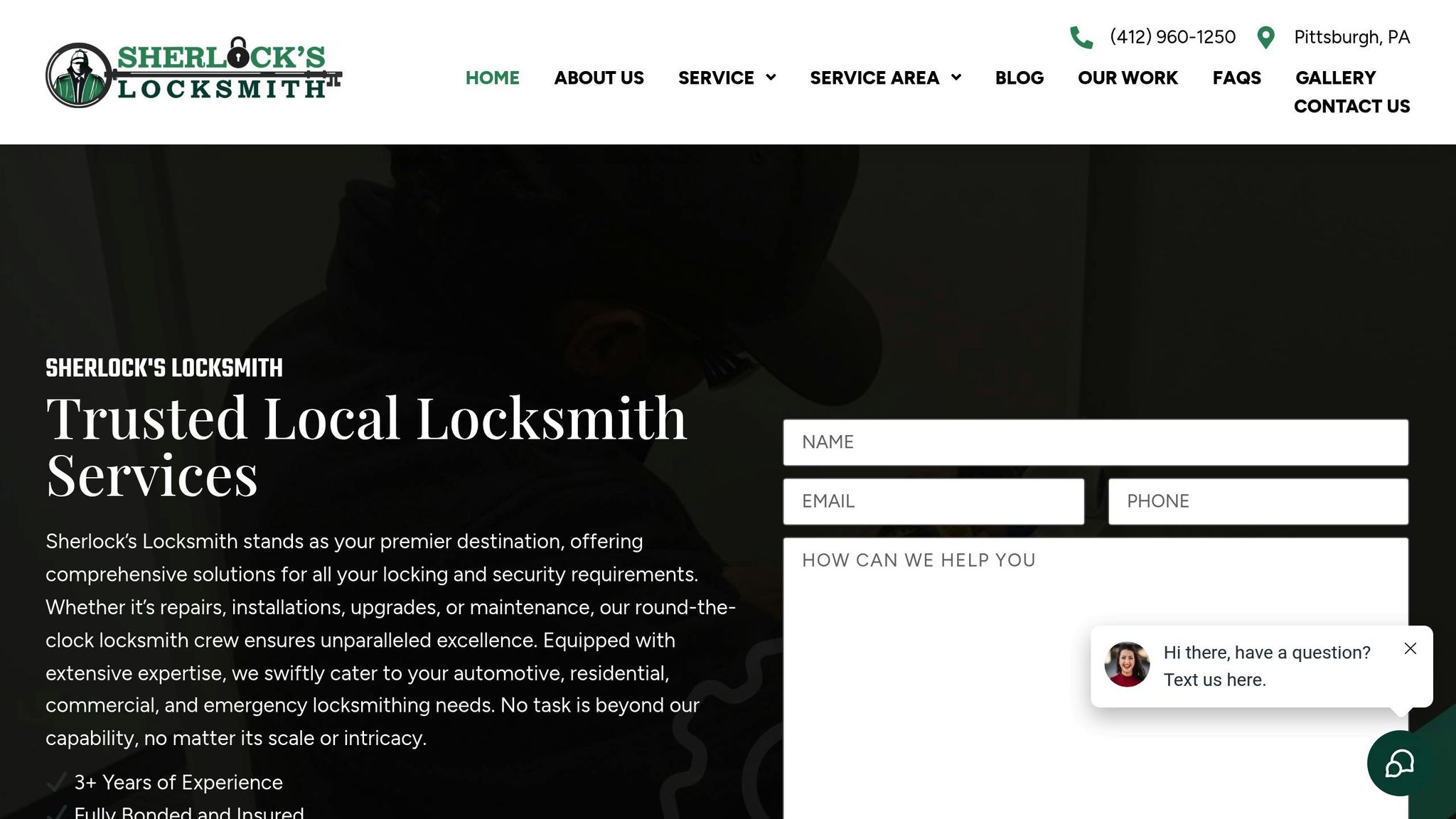
For those moments when DIY isn’t practical or safe, a trusted local locksmith like Sherlock’s Locksmith can step in. Offering 24/7 mobile service, their certified technicians specialize in everything from emergency lockouts to advanced security system installations.
Whether you need lock repairs, rekeying, key duplication, or modern solutions like keyless entry and biometric locks, Sherlock’s Locksmith has the tools and expertise to handle it all. Their mobile service adds convenience, ensuring you get help when and where you need it – no waiting for business hours or struggling to transport damaged locks.
For Pittsburgh residents, having a reliable locksmith like Sherlock’s Locksmith provides peace of mind. They offer professional-grade tools, extensive training, and fast, effective solutions for everything from emergencies to complex security needs. When DIY isn’t enough, their expertise ensures your home or business stays secure.
Conclusion: Balancing Cost, Convenience, and Security
Choosing between DIY and professional locksmith services comes down to your skills, time, budget, and how critical security is for the situation. Each option has its benefits, but the best choice depends on your abilities and the importance of getting the job done right.
DIY projects can save money upfront, but mistakes may lead to added expenses down the line. On the other hand, hiring a professional locksmith might cost more initially, but their expertise ensures the work is done correctly, avoiding costly errors.
When it comes to your home’s main entry points, high-security locks, or addressing a break-in, it’s not worth cutting corners to save a few dollars. These situations demand precision and experience that often go beyond the scope of DIY efforts. Professional installation or repair provides the peace of mind you need when safety is on the line.
For emergencies like lockouts, broken keys, or urgent security concerns, having access to 24/7 services – such as those offered by Sherlock’s Locksmith – can be a lifesaver. These situations require quick, reliable solutions to keep you and your property secure.
Be honest about your abilities. If you’re handy with tools and tackling a low-risk task like fixing an interior door or a storage lock, DIY might be a good fit. But for complex systems, urgent issues, or anything tied to your primary security, professional help ensures both immediate results and long-term reliability.
FAQs
What are some common mistakes people make with DIY lock repairs, and how can they avoid them?
Attempting to fix a lock on your own might seem like a quick solution, but it can sometimes backfire and lead to expensive repairs. One common mistake is applying too much force, which can damage the lock’s internal mechanisms. Another issue is using the wrong lubricant – household oils, for instance, tend to attract dirt, eventually causing the lock to stick or jam. Misaligning parts during reassembly or ignoring signs of wear can also make things worse.
To steer clear of these problems, stick to the right tools and methods. Use lubricants specifically made for locks, like graphite or silicone sprays, to keep things running smoothly. And if the repair feels too tricky or you’re unsure what to do, reaching out to a professional locksmith is the safest way to keep your lock working properly.
How can I tell if a lock problem is too complicated for DIY repair and needs a locksmith?
If your lock shows signs of visible damage – like cracks, dents, or broken parts – or feels jammed, stuck, or unusually difficult to use, it’s probably time to reach out to a professional. Problems such as a key that’s tough to turn, a lock that works inconsistently, or mechanisms that feel loose or unresponsive often point to underlying issues that quick DIY fixes could make worse.
Trying to tackle a complex lock problem on your own might not only lead to more damage but could also compromise your security. For a reliable solution and peace of mind, it’s smarter to call a certified locksmith. They have the proper tools and expertise to handle repairs or replacements efficiently and correctly.
What should I consider when comparing the long-term costs of fixing a lock yourself versus hiring a locksmith?
When considering long-term expenses, it’s crucial to look beyond just the upfront cost. DIY lock repairs might appear budget-friendly at first, but a small mistake could result in bigger problems. You could end up damaging the lock or even compromising your home’s security, leading to more repairs or potential replacements. These added costs can pile up quickly.
In contrast, hiring a professional locksmith might seem pricey initially – typically ranging from $50 to $215 per hour – but it comes with clear advantages. Professionals ensure the work is done properly and efficiently, often backing their services with warranties. This not only minimizes the chance of future issues but can also save you money over time. Choosing a certified locksmith means greater peace of mind and stronger security for your home.



